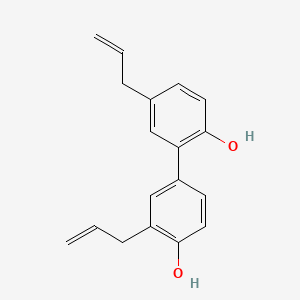Ferroptosis-centered Drug Response Information
General Information of the Drug (ID: ferrodrug0205)
| Name |
Honokiol
|
||||
|---|---|---|---|---|---|
| Synonyms |
Honokiol; 35354-74-6; 5,3'-Diallyl-2,4'-dihydroxybiphenyl; NSC 293100; 3,5'-Diallyl-4,2'-dihydroxybiphenyl; C18H18O2; 3',5-diallyl-2,4'-biphenyldiol; 3',5-Diallylbiphenyl-2,4'-diol; CPD000387107; CHEMBL16901; 2-(4-hydroxy-3-prop-2-enylphenyl)-4-prop-2-enylphenol; CHEBI:5759; 4-allyl-2-(3-allyl-4-hydroxy-phenyl)phenol; 11513CCO0N; 2-[4-hydroxy-3-(prop-2-en-1-yl)phenyl]-4-(prop-2-en-1-yl)phenol; 5,3'-Diallyl-biphenyl-2,4'-diol; MFCD00016674; [1,1'-Biphenyl]-2,4'-diol, 3',5-di-2-propenyl-; NSC-293100; 2-(4-hydroxy-3-prop-2-enyl-phenyl)- 4-prop-2-enyl-phenol; 3',5-(5,5'-)Diallyl-[1,1'-biphenyl]-2,4'-(2,2'-)diol; Honokiol,(S); SMR000387107; 3',5-di(prop-2-en-1-yl)biphenyl-2,4'-diol; (1,1'-BIPHENYL)-2,4'-DIOL, 3',5-DI-2-PROPENYL-; UNII-11513CCO0N; -dihydroxydiphenyl; 3',5-diallyl-[1,1'-biphenyl]-2,4'-diol; Honokiol, HO; 5,3′ Honokiol - 95%; -Diallyl-2,4′ FMLT BSASM H; HONOKIOL [INCI]; HONOKIOL [MI]; HONOKIOL [WHO-DD]; Honokiol, analytical standard; cid_72303; MLS000759481; MLS001048916; MLS001423980; MLS006011755; SCHEMBL133034; REGID_for_CID_72303; GTPL11610; DTXSID30188845; 3',1'-biphenyl)-2,4'-diol; FVYXIJYOAGAUQK-UHFFFAOYSA-N; HMS2051C12; HMS2271J07; HMS3393C12; HMS3656G03; (1,1'-BIPHENYL)-2,4'-DIOL, 3',5-DI-2-PROPEN-1-YL-; AMY40657; BCP28282; HY-N0003; AC-486; BBL027819; BDBM50157304; HB0328; NSC293100; s2310; STK801954; 3'',5-diallylbiphenyl-2,4''-diol; Honokiol, >=98% (HPLC), powder; 3,5'-diallyl-2',4-dihydroxybiphenyl; AKOS005622639; 3',5-Diallyl-2,4'-dihydroxybiphenyl; CCG-100864; CS-1696; NC00114; 5,3''-Diallyl-biphenyl-2,4''-diol; SMP2_000040; NCGC00163567-01; NCGC00163567-02; NCGC00163567-03; NCGC00163567-08; AS-15333; XH163752; 5,3''''-Diallyl-biphenyl-2,4''''-diol; FT-0601638; H1309; SW197494-3; EN300-7399522; A822747; SR-01000758208; Q-100425; Q5896650; SR-01000758208-5; {1,1'-Biphenyl]-2,4'-diol, 3,5-di-2-propenyl-; 3'',5-di-2-propenyl-1,1''-biphenyl-2,4''-diol; BRD-K98493452-001-01-6; 3',5-Di-2-propen-1-yl[1,1'-biphenyl]-2,4'-diol; Honokiol, European Pharmacopoeia (EP) Reference Standard; Z2065671480; [1,1'-Biphenyl]-2,4'-diol, 3',5-di-2-propen-1-yl; 4-[2-hydroxy-5-(prop-2-en-1-yl)phenyl]-2-(prop-2-en-1-yl)phenol; 947686-05-7; InChI=1/C18H18O2/c1-3-5-13-7-9-18(20)16(11-13)14-8-10-17(19)15(12-14)6-4-2/h3-4,7-12,19-20H,1-2,5-6H
Click to Show/Hide
|
||||
| Structure |
 |
||||
| Formula |
C18H18O2
|
||||
| IUPAC Name |
2-(4-hydroxy-3-prop-2-enylphenyl)-4-prop-2-enylphenol
|
||||
| Canonical SMILES |
C=CCC1=CC(=C(C=C1)O)C2=CC(=C(C=C2)O)CC=C
|
||||
| InChI |
InChI=1S/C18H18O2/c1-3-5-13-7-9-18(20)16(11-13)14-8-10-17(19)15(12-14)6-4-2/h3-4,7-12,19-20H,1-2,5-6H2
|
||||
| InChIKey |
FVYXIJYOAGAUQK-UHFFFAOYSA-N
|
||||
| PubChem CID | |||||
Full List of Ferroptosis Target Related to This Drug
Phospholipid hydroperoxide glutathione peroxidase (GPX4)
| In total 1 item(s) under this Target | |||||
| Experiment 1 Reporting the Ferroptosis-centered Drug Act on This Target | [1] | ||||
| Target for Ferroptosis | Suppressor | ||||
| Responsed Disease | Colon cancer | ICD-11: 2B90 | |||
| Pathway Response | Fatty acid metabolism | hsa01212 | |||
| Ferroptosis | hsa04216 | ||||
| Glutathione metabolism | hsa00480 | ||||
| Cell Process | Cell ferroptosis | ||||
| In Vitro Model | SW48 cells | Colon adenocarcinoma | Homo sapiens | CVCL_1724 | |
| HT29 cells | Colon cancer | Mus musculus | CVCL_A8EZ | ||
| LS174T cells | Colon adenocarcinoma | Homo sapiens | CVCL_1384 | ||
| HCT 116 cells | Colon carcinoma | Homo sapiens | CVCL_0291 | ||
| HCT-8 cells | Ileocecal adenocarcinoma | Homo sapiens | CVCL_2478 | ||
| RKO cells | Colon carcinoma | Homo sapiens | CVCL_0504 | ||
| SW480 cells | Colon adenocarcinoma | Homo sapiens | CVCL_0546 | ||
| In Vivo Model |
Ten BALB/c nude mice (male, 4 weeks old, 18.0 ± 2.0 g) were randomly divided into two groups for the in vivo xenograft assay. Mice were injected with 5 x 106 RKO cells with stable overexpression GPX4 (described Lv-GPX4 group), control vector (described Lv-NC group). Cells were subcutaneously injected into the right anterior axilla of mice in both groups. Mice then received HNK (0.5 mg/kg/w) by intraperitoneal injection for 4 weeks. The subcutaneous tumor volumes in the nude mice in the two groups were recorded every two days.
Click to Show/Hide
|
||||
| Response regulation | Honokiol reduced the viability of Colon cancer (CC) cell lines by increasing ROS and Fe2+levels. HNK decreased the activity of Glutathione Peroxidase 4 (GPX4) but did not affect system Xc-. Thus, HNK can induce ferroptosis in CC cells by reducing the activity of GPX4. | ||||
Heme oxygenase 1 (HMOX1)
| In total 1 item(s) under this Target | ||||
| Experiment 1 Reporting the Ferroptosis-centered Drug Act on This Target | [2] | |||
| Target for Ferroptosis | Driver | |||
| Responsed Disease | Acute myeloid leukaemia | ICD-11: 2A60 | ||
| Pathway Response | Fatty acid metabolism | hsa01212 | ||
| Cell Process | Cell ferroptosis | |||
| Cell proliferation | ||||
| In Vitro Model | THP-1 cells | Childhood acute monocytic leukemia | Homo sapiens | CVCL_0006 |
| U-937 cells | Adult acute monocytic leukemia | Homo sapiens | CVCL_0007 | |
| SKM-1 cells | Acute myeloid leukemia | Homo sapiens | CVCL_0098 | |
| Response regulation | Honokiol decreased the viability of the targeted Acute myeloid leukemia cells, induced their cell cycle arrest at G0/G1 phase, and inhibited their colony-formation capacity. Honokiol also triggers a noncanonical ferroptosis pathway in THP-1 and U-937 cells by upregulating the level of intracellular lipid peroxide and HMOX1 significantly. And HMOX1 was a critical target in honokiol-induced ferroptosis. | |||
References
